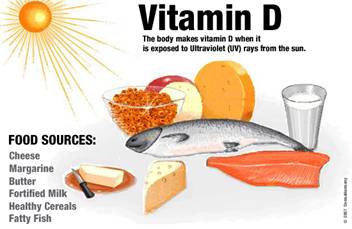 Vitamin D deficient diet eaters are at an increased risk of stroke later in life. "Increasing dietary vitamin D intake might be beneficial for stroke prevention," said first author Gotaro Kojima, MD, (from the John A. Burns School of Medicine, University of Hawaii, Department of Geriatric Medicine in Honolulu) Vitamin D deficient diet eaters are at an increased risk of stroke later in life. "Increasing dietary vitamin D intake might be beneficial for stroke prevention," said first author Gotaro Kojima, MD, (from the John A. Burns School of Medicine, University of Hawaii, Department of Geriatric Medicine in Honolulu) 
 There was only one study "which demonstrated that higher vitamin D intake was associated with lower stroke incidence. This study's findings were consistent with this previous study. However, we had a 10-fold larger population size and a 3-fold longer follow-up period," Dr. Kojima said. There was only one study "which demonstrated that higher vitamin D intake was associated with lower stroke incidence. This study's findings were consistent with this previous study. However, we had a 10-fold larger population size and a 3-fold longer follow-up period," Dr. Kojima said.
 The Honolulu Heart Program is a prospective population-based cohort study of 8006 Japanese-American men in Hawaii who were 45 to 68 years old at the baseline examination in 1965 to 1968. Dietary vitamin D intake was calculated using the Nutritionist IV Version 3 software from a 24-hour dietary recall. Subjects with prevalent stroke were excluded, leaving 7385 men followed through 1999 for incident stroke. Subjects were divided into quartiles of dietary vitamin D for analysis. The Honolulu Heart Program is a prospective population-based cohort study of 8006 Japanese-American men in Hawaii who were 45 to 68 years old at the baseline examination in 1965 to 1968. Dietary vitamin D intake was calculated using the Nutritionist IV Version 3 software from a 24-hour dietary recall. Subjects with prevalent stroke were excluded, leaving 7385 men followed through 1999 for incident stroke. Subjects were divided into quartiles of dietary vitamin D for analysis.
 At baseline, the men's average intake of dietary vitamin D was 3.62 µg/day (range, 0.00 - 211.60 µg/day). During 34 years of follow-up, incident stroke occurred in 960 men. There were 651 (68%) thromboembolic strokes, 269 (28%) hemorrhagic strokes, and 40 (4%) strokes of unknown type. At baseline, the men's average intake of dietary vitamin D was 3.62 µg/day (range, 0.00 - 211.60 µg/day). During 34 years of follow-up, incident stroke occurred in 960 men. There were 651 (68%) thromboembolic strokes, 269 (28%) hemorrhagic strokes, and 40 (4%) strokes of unknown type. |
